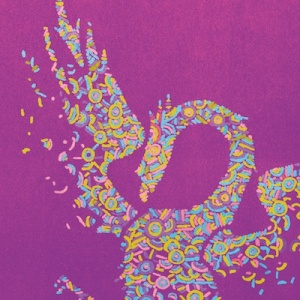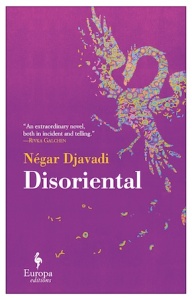Piercing prisms and Persian perspectives
by Mika Provata-Carlone “The truth of memory is strange, isn’t it? Our memories select, eliminate, exaggerate, minimize, glorify, denigrate. They create their own versions of events and serve up their own reality. Disparate but cohesive. Imperfect yet sincere.” Thus begins a compulsive, fiercely resisted, yet inevitable journey into memory in this in many ways extraordinary novel – the memory of a family, a nation, an identity, the archetypes of an impossible, yet indispensable exilic remembrance and space.
“The truth of memory is strange, isn’t it? Our memories select, eliminate, exaggerate, minimize, glorify, denigrate. They create their own versions of events and serve up their own reality. Disparate but cohesive. Imperfect yet sincere.” Thus begins a compulsive, fiercely resisted, yet inevitable journey into memory in this in many ways extraordinary novel – the memory of a family, a nation, an identity, the archetypes of an impossible, yet indispensable exilic remembrance and space.
In Disoriental, Négar Djavadi succeeds in summoning before our eyes ghosts and demons of Persia’s past, fallen angels and tragic martyrs of its future as Iran, the dark shadows of a today that is as much beyond reach for her main character as it is for many beyond comprehension or even conception. Her brandishing of facts and chronologies is meticulous and commanding, her narrative is textured, prismatic, and in turns fast and furious, or a soulful lament in the many minor keys of the Orient. She paints for us in broad, daring, often explicitly provocative brushstrokes an immense tableau of glory and decay, or of simple, broken lives, filling it with intricate details of names, genealogies, events, cultural echoes and historical monuments as rich as an arabesque. A reminder of all that once was, all that the West (and perhaps Persians/Iranians themselves) may have all but forgotten. In a way, the theme of Disoriental could be summed up in a twist of the words that used to be inscribed on old grandfather clocks: “Time is. Time was. Time will never be.”
Disoriental is a waterfall of words and memories; of emotional states and the most intimate states of being; of echoes of a culture, a history few now suspect or can recall to memory and to imagination.”
Djavadi writes in a palindromic motion between past and present. She gives us a vast, kaleidoscopic panorama of the early twentieth century under Qajar rule, returns repeatedly to the land’s tribulations in the hands of the Russians, the British, the French and the Americans, focuses unflinchingly on the assassinations, machinations, and the rough friction with oncoming modernity that sealed the country’s destiny. The Shah and Khomeini, the Revolution and SAVAK terror loom overwhelmingly over the biographies underpinning what is no less than a dirge and a paean to a country and its people. Disoriental is a waterfall of words and memories; of emotional states and the most intimate states of being; of echoes of a culture, a history few now suspect or can recall to memory and to imagination, let alone wishing to acknowledge as a presence, a force, as the vital, mystical, broken path of many lives. At its most poignant, Disoriental is about the voices compelled to speak about a nation once noble, mythical, now deemed an incomprehensible anathema.
Djavadi populates her determinedly biographical story (she has resisted the term autobiographical) with formidable, not always benevolent women, with complex, complicated men, with the pungent scents and opulent gestures, the mythical reality, superstitions, dark secrets and webs of the Orient, but also with the starker reality of the exotic, irresistibly alluring, terrifying and alienating otherness of Paris, and of French words rolled on Persian tongues. Hers is a historical narrative that engulfs, amoeba-like, or sterilises, amputates, eradicates. Lost homelands, identities, rituals binding one to life, exilic places or states of belonging become the contending forces ruling the psyches of her characters, who seem suspended over the yearned for yet almost always impossible space of their existence, beyond the time of a sense of being.
The West is presented as free from the political nightmares of the East, yet also as bereft of a closer, vital sense of unmediated community. The East lives for and in stories, by means of a national or communal mythology, whereas the French and Western democracies do not experience this need for a collective narrative of protection, of networks of relationships that fend off public terror. At the same time, however, nor do they provide the humanity that binds one individual life to another, that sustains an individual and a community through private or shared trauma. Embarrassing, comforting or suffocating proximity translates and is displaced through the exilic experience as isolation, fragmentation, erasure.
Djavadi skilfully interweaves different voices and contradicting narrative authorities: the cultural and historical pundit, the first person, biased, fluid and unreliable narrator, the omniscient, ceaselessly commentating puppeteer.”
Disoriental is a story of nostalgia and of piercing clarity as to the true nature of many of the aspects of the lost paradise at its heart – whether it is the almost Edenic landscape of Mazandaran and the imaginary or real Sadr clan or of a Persia where disparate, clashing forces have been coming to consecutive bloody standstills for the past fifty-odd years. Djavadi skilfully interweaves different voices and contradicting narrative authorities: the cultural and historical pundit, the first person, biased, fluid and unreliable narrator, the omniscient, ceaselessly commentating puppeteer invoked through mechanisms such as Wikipedia footnotes or documentary-style rhetoric. She gives us sharply shifting angles and perspectives, constantly undermining readerly convictions and certainties, only to create an inalienable bond and fascination between the reader and the authorial subject. The complicity is not always innocent or risk-free, to the extent that it is Raskolnikov and Dostoevsky who provide the psychological, essentially schismatic (as in the etymology of the Russian hero’s name) mirror into a denatured world.
The title of the novel is as rich in possibilities as Djavadi’s story, and it is all too tempting not to see there a nudge at Edward Said’s polemics of Orientalism, as well as the sense of disorientation that both political catastrophe and exile have imposed on fictional characters and real lives. Also the process of removing from oneself the layers of belonging to an original culture not in order to embed oneself in the adopted culture, but so as to sever all disorienting attachments. Part of the novel is the struggle to disintegrate in order to integrate, taken to the extreme of risking total and irreversible effacement.
This is an impulsive, de profundis novel, as much a historical testimony (the narrator defines herself as the guardian of stories, the voice of memory), as it is a double-act of sorts – a love poem to a culture and people and a steely, often angry clinical report dissecting every layer of that nation’s identity, psychodrama, guilt, destiny and fatalism. The complexities of history result at times in tangled nets of psychological analysis, introspection and identity politics, as well as of a permeating, not always reflected causality – into a genealogy of difference that is moving, personally engaging, but also problematic in its literary realisation, in equal measure. The attempt at a stark and vitally original bildungsroman sometimes misses its mark due to an overpowering sense of predestination, an ineffable sense of conditioning, or self-victimisation – within the context of history, emotional representation or identity.
Djavadi’s writing has the quality she singles out as emblematic of her country – it possess truly impressive raw, terrible beauty.”
When the story focuses on the historical experience of individuals, on the existential, national, personal trauma of a moment in time whose duration is still ongoing, Djavadi’s writing has the quality she singles out as emblematic of her country – it possess truly impressive “raw, terrible beauty”. Two-thirds of the novel at the very least possess this ‘terrible’ power to engross us, arrest us, and also create in us an almost Kantian drive to read closely and personally, from a sense of purposeful yet disinterested human duty; because the feelings contained, the experiences related, the vision of existential annihilation held up for our scrutiny and compassion are “as terrifying as a decomposing corpse”. The more intimate third of the novel, what ought to have been the main character’s emergence into a reconstructed, post-destruction and post-deconstruction life, is somewhat weaker, even if it is unfailingly human. Djavadi’s strength is to be a very evocative and talented cinematographer of words, to create, as she hints at the end of a novel, the effect of “rear projection” on the page – a character staring at the narrative of his or her life as it flashes before them only for the viewers to see. She has a fine talent for visualising with words what she ‘sees’ in her mind as the storyline of her characters’ lives, and every single passage and scene where she uses these skills has tremendous force and appeal. When she tries to offer a more inward psychological characterisation, there is a feeling that she does not trust enough in the authenticity of her authorial aims to achieve a result that is uncluttered by a latent, yet not infrequent sense of melodrama, or even of engaged rhetoric. She has chosen to interweave three themes, history, exile and gender identity, and to employ two registers, a rhetorically analytical, factual, even if ironic, historical exposé and a more fragile, self-confessional yet also transgressively public voice. With a better sense of balance, these truly mighty forces would have joined in irresistible, contrapuntal polyphony. As it is, they often interdigitate awkwardly, uncertainly, unconvincingly. But these are secondary quibbles. Disoriental will certainly leave readers both shocked and gripped, in the very best sense of the words, and hopefully it will lead to unsuspected encounters with its themes beyond its pages. It rings with the echoes of many, honeysuckle-scented Arabian Nights, as well as the cruel weight of a haunting history beyond fables and tales, with human stories we would do well to listen to.
 Négar Djavadi was born in Iran in 1969 to a family of intellectuals opposed to the regimes of both the Shah, then Khomeini. She arrived in France at the age of eleven, having crossed the mountains of Kurdistan on horseback with her mother and sister. She is a screenwriter and lives in Paris. Désorientale (Editions Liana Levi, 2016) scooped six awards including the Prix Roman-News, Prix du Style, Lire Best Debut Novel and the Prix littéraire de la Porte Dorée. It is now published as Disoriental by Europa Editions in paperback and eBook, translated by Tina Kover.
Négar Djavadi was born in Iran in 1969 to a family of intellectuals opposed to the regimes of both the Shah, then Khomeini. She arrived in France at the age of eleven, having crossed the mountains of Kurdistan on horseback with her mother and sister. She is a screenwriter and lives in Paris. Désorientale (Editions Liana Levi, 2016) scooped six awards including the Prix Roman-News, Prix du Style, Lire Best Debut Novel and the Prix littéraire de la Porte Dorée. It is now published as Disoriental by Europa Editions in paperback and eBook, translated by Tina Kover.
Read more
@NegarDjav
Author portrait © Philippe Matsas / Opale / Leemage / Editions Liana Levi
Tina Kover’s translations include the Modern Library edition of Georges by Alexandre Dumas, The Black City by George Sand, and Anna Gavalda’s Life, Only Better. In 2009 she received a National Endowment for the Arts Literature Fellowship for her translation of Manette Salomon by Edmond and Jules de Goncourt.
@tinakover
Mika Provata-Carlone is an independent scholar, translator, editor and illustrator, and a contributing editor to Bookanista. She has a doctorate from Princeton University and lives and works in London.


